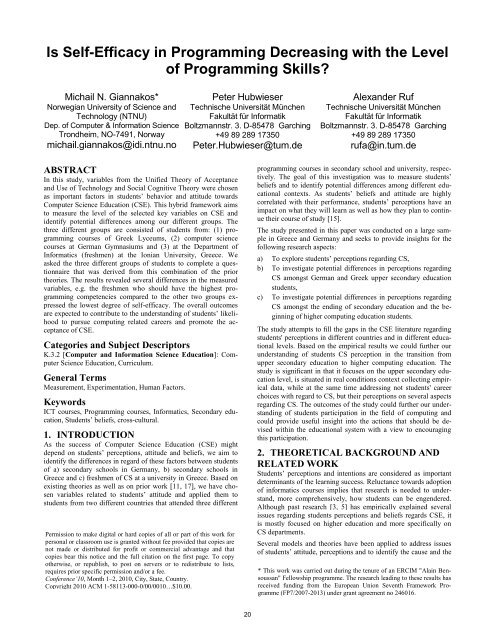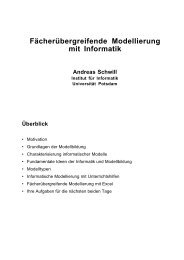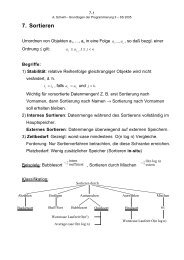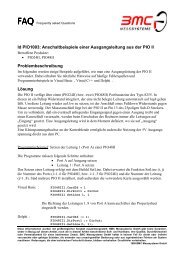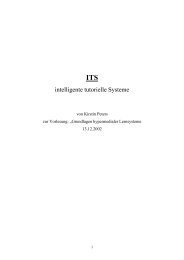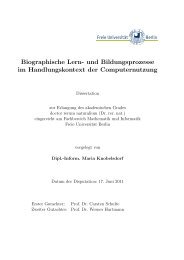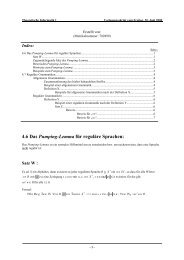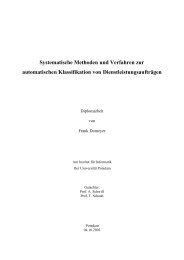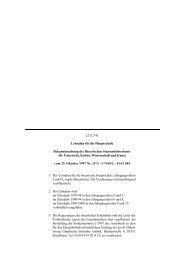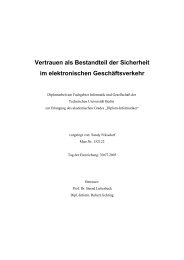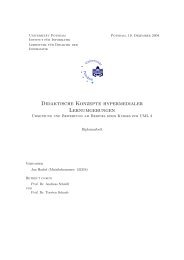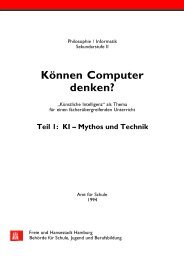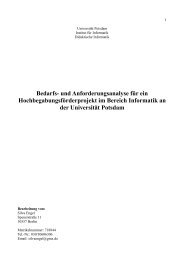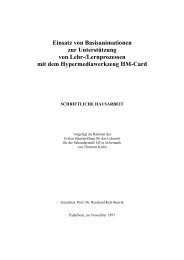Maria Knobelsdorf, University of Dortmund, Germany - Didaktik der ...
Maria Knobelsdorf, University of Dortmund, Germany - Didaktik der ...
Maria Knobelsdorf, University of Dortmund, Germany - Didaktik der ...
Create successful ePaper yourself
Turn your PDF publications into a flip-book with our unique Google optimized e-Paper software.
Is Self-Efficacy in Programming Decreasing with the Level<br />
<strong>of</strong> Programming Skills?<br />
Michail N. Giannakos*<br />
Norwegian <strong>University</strong> <strong>of</strong> Science and<br />
Technology (NTNU)<br />
Dep. <strong>of</strong> Computer & Information Science<br />
Trondheim, NO-7491, Norway<br />
michail.giannakos@idi.ntnu.no<br />
ABSTRACT<br />
In this study, variables from the Unified Theory <strong>of</strong> Acceptance<br />
and Use <strong>of</strong> Technology and Social Cognitive Theory were chosen<br />
as important factors in students’ behavior and attitude towards<br />
Computer Science Education (CSE). This hybrid framework aims<br />
to measure the level <strong>of</strong> the selected key variables on CSE and<br />
identify potential differences among our different groups. The<br />
three different groups are consisted <strong>of</strong> students from: (1) programming<br />
courses <strong>of</strong> Greek Lyceums, (2) computer science<br />
courses at German Gymnasiums and (3) at the Department <strong>of</strong><br />
Informatics (freshmen) at the Ionian <strong>University</strong>, Greece. We<br />
asked the three different groups <strong>of</strong> students to complete a questionnaire<br />
that was <strong>der</strong>ived from this combination <strong>of</strong> the prior<br />
theories. The results revealed several differences in the measured<br />
variables, e.g. the freshmen who should have the highest programming<br />
competencies compared to the other two groups expressed<br />
the lowest degree <strong>of</strong> self-efficacy. The overall outcomes<br />
are expected to contribute to the un<strong>der</strong>standing <strong>of</strong> students’ likelihood<br />
to pursue computing related careers and promote the acceptance<br />
<strong>of</strong> CSE.<br />
Categories and Subject Descriptors<br />
K.3.2 [Computer and Information Science Education]: Computer<br />
Science Education, Curriculum.<br />
General Terms<br />
Measurement, Experimentation, Human Factors.<br />
Keywords<br />
ICT courses, Programming courses, Informatics, Secondary education,<br />
Students’ beliefs, cross-cultural.<br />
1. INTRODUCTION<br />
As the success <strong>of</strong> Computer Science Education (CSE) might<br />
depend on students’ perceptions, attitude and beliefs, we aim to<br />
identify the differences in regard <strong>of</strong> these factors between students<br />
<strong>of</strong> a) secondary schools in <strong>Germany</strong>, b) secondary schools in<br />
Greece and c) freshmen <strong>of</strong> CS at a university in Greece. Based on<br />
existing theories as well as on prior work [11, 17], we have chosen<br />
variables related to students’ attitude and applied them to<br />
students from two different countries that attended three different<br />
Permission to make digital or hard copies <strong>of</strong> all or part <strong>of</strong> this work for<br />
personal or classroom use is granted without fee provided that copies are<br />
not made or distributed for pr<strong>of</strong>it or commercial advantage and that<br />
copies bear this notice and the full citation on the first page. To copy<br />
otherwise, or republish, to post on servers or to redistribute to lists,<br />
requires prior specific permission and/or a fee.<br />
Conference’10, Month 1–2, 2010, City, State, Country.<br />
Copyright 2010 ACM 1-58113-000-0/00/0010…$10.00.<br />
Peter Hubwieser<br />
Technische Universität München<br />
Fakultät für Informatik<br />
Boltzmannstr. 3. D-85478 Garching<br />
+49 89 289 17350<br />
Peter.Hubwieser@tum.de<br />
20<br />
Alexan<strong>der</strong> Ruf<br />
Technische Universität München<br />
Fakultät für Informatik<br />
Boltzmannstr. 3. D-85478 Garching<br />
+49 89 289 17350<br />
rufa@in.tum.de<br />
programming courses in secondary school and university, respectively.<br />
The goal <strong>of</strong> this investigation was to measure students’<br />
beliefs and to identify potential differences among different educational<br />
contexts. As students’ beliefs and attitude are highly<br />
correlated with their performance, students’ perceptions have an<br />
impact on what they will learn as well as how they plan to continue<br />
their course <strong>of</strong> study [15].<br />
The study presented in this paper was conducted on a large sample<br />
in Greece and <strong>Germany</strong> and seeks to provide insights for the<br />
following research aspects:<br />
a) To explore students’ perceptions regarding CS,<br />
b) To investigate potential differences in perceptions regarding<br />
CS amongst German and Greek upper secondary education<br />
students,<br />
c) To investigate potential differences in perceptions regarding<br />
CS amongst the ending <strong>of</strong> secondary education and the beginning<br />
<strong>of</strong> higher computing education students.<br />
The study attempts to fill the gaps in the CSE literature regarding<br />
students' perceptions in different countries and in different educational<br />
levels. Based on the empirical results we could further our<br />
un<strong>der</strong>standing <strong>of</strong> students CS perception in the transition from<br />
upper secondary education to higher computing education. The<br />
study is significant in that it focuses on the upper secondary education<br />
level, is situated in real conditions context collecting empirical<br />
data, while at the same time addressing not students' career<br />
choices with regard to CS, but their perceptions on several aspects<br />
regarding CS. The outcomes <strong>of</strong> the study could further our un<strong>der</strong>standing<br />
<strong>of</strong> students participation in the field <strong>of</strong> computing and<br />
could provide useful insight into the actions that should be devised<br />
within the educational system with a view to encouraging<br />
this participation.<br />
2. THEORETICAL BACKGROUND AND<br />
RELATED WORK<br />
Students’ perceptions and intentions are consi<strong>der</strong>ed as important<br />
determinants <strong>of</strong> the learning success. Reluctance towards adoption<br />
<strong>of</strong> informatics courses implies that research is needed to un<strong>der</strong>stand,<br />
more comprehensively, how students can be engen<strong>der</strong>ed.<br />
Although past research [3, 5] has empirically explained several<br />
issues regarding students perceptions and beliefs regards CSE, it<br />
is mostly focused on higher education and more specifically on<br />
CS departments.<br />
Several models and theories have been applied to address issues<br />
<strong>of</strong> students’ attitude, perceptions and to identify the cause and the<br />
* This work was carried out during the tenure <strong>of</strong> an ERCIM "Alain Bensoussan"<br />
Fellowship programme. The research leading to these results has<br />
received funding from the European Union Seventh Framework Programme<br />
(FP7/2007-2013) un<strong>der</strong> grant agreement no 246016.


